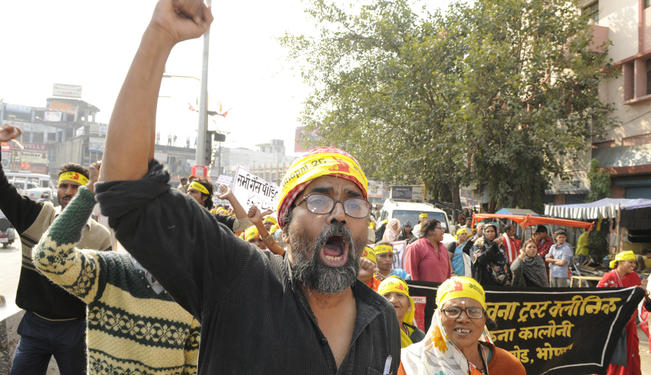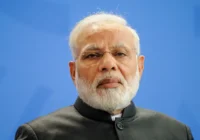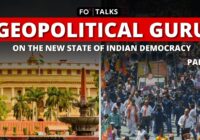American exceptionalism is still prevalent, especially when it comes to India and Modi.
In their recent article published in Fair Observer, Reza Aslan and Michael Brooks make the argument that the United States should withdraw from deepening its bilateral relationship with India, if Narendra Modi comes to power. The article draws the conclusion that in the end, it is up to India’s voters to decide whether Modi becomes the next prime minister or not.
Put otherwise, just in case there’s any doubt, it isn’t up to the US (or any other country for that matter) to determine India’s next government, or who might lead it. That’s comforting to know. Imagine what the response might have been during the 2004 presidential election in the United States if the Chinese or the Russians had threatened American voters with consequences over re-electing George Bush?
Aslan and Brooks' article further concludes that Indian voters should be aware that electing Modi would slow or reverse vital Indian economic goals, and that the Obama administration should make it clear that the US will not forge a closer relationship with an India led by Modi.
Firstly, it’s not quite clear what the authors are suggesting here. What precisely should the US do in such circumstances? Send a letter of disapproval? Not pitch for the next arms contract? Some clarity on the response and the likely outcome of that response would be welcome, but then again, we should keep in mind the inability of American foreign policy to consider the consequences of its actions in general.
But secondly, how precisely will the election of Modi slow India's growth, and how will it reverse economic goals? Perhaps the authors could shed some light on what India’s vital economic goals are? I’m also left wondering how the authors could possibly empathize with what the "Indian voter" actually wants?
I’d be reluctant to generalize who the average Indian voter actually is, let alone, second-guess what his or her political and economic goals might be. I would, however, be brave enough to guess that the privilege of shopping at Walmart or buying genetically-modified crops are not high on the list. Perhaps a little clarity on this would be helpful, rather than relying on what appears to be a priori assumptions?
Ultimately, I’m left wondering whether the CEOs of Boeing, General Motors, Westinghouse, Lockheed, and the plethora of other US business giants share the same viewpoint as the authors, and find it strange that they haven’t come out into the media to push the same worthy moral agenda. Why isn’t Starbucks publically disapproving of the possibility of a Modi-led government? I’m somewhat surprised and disappointed that they haven’t joined the chorus. Perhaps if they had, I’d have a little more sympathy for the authors' position.
American Exceptionalism
Perhaps the real story here is the discrepancy between a moralistic foreign policy on the one hand, and the silence of corporate America on the other. They don’t seem to be too bothered about who’s in power, or whose rights are being abused; so long the cash registers ring and the profit margins increase. Rather than telling Indian voters who they should or shouldn’t be electing, shouldn’t the authors be telling American businesses who they should and shouldn’t be doing business with? It’s a hallmark of any democracy, that it should be able to elect its own representatives, free from external interference or the benign best intentions of others.
Broadly speaking, the United States has, for the past 60 years or so, unilaterally installed or supported human rights abusing tyrants across Central and South America, the African continent, the Middle East, and much of Southeast Asia to prevent the contagion of independent, social and economic progress from spreading and threatening American vested interests. Why don’t we hear more disapproval from the US about the puppet dictators they’ve installed, who have abused and tortured their own citizens? There is no shortage of examples.
Whether we like the conclusion or not, countless independent enquiries, commissions and court cases across India have acquitted Modi from responsibility of the dreadful events that occurred in Ahmedabad in 2002.
But will the US one day recognize that it has its own fair share of far-right nationalists who have presided over and been unable to prevent dreadful events? I look forward to the day when the same kind of judicial process is launched against Henry Kissinger, George Bush and others, responsible for the consequences of American interventions in the domestic affairs of other states over the past 50 years or so.
Ultimately, while India’s enormous economic, political and social problems (and failings) are abundantly clear for all to see, it’s still a great pity that American exceptionalism and hypocrisy isn’t.
The views expressed in this article are the author's own and do not necessarily reflect Fair Observer’s editorial policy.
Image: Copyright © Shutterstock. All Rights Reserved
Support Fair Observer
We rely on your support for our independence, diversity and quality.
For more than 10 years, Fair Observer has been free, fair and independent. No billionaire owns us, no advertisers control us. We are a reader-supported nonprofit. Unlike many other publications, we keep our content free for readers regardless of where they live or whether they can afford to pay. We have no paywalls and no ads.
In the post-truth era of fake news, echo chambers and filter bubbles, we publish a plurality of perspectives from around the world. Anyone can publish with us, but everyone goes through a rigorous editorial process. So, you get fact-checked, well-reasoned content instead of noise.
We publish 2,500+ voices from 90+ countries. We also conduct education and training programs
on subjects ranging from digital media and journalism to writing and critical thinking. This
doesn’t come cheap. Servers, editors, trainers and web developers cost
money.
Please consider supporting us on a regular basis as a recurring donor or a
sustaining member.
Will you support FO’s journalism?
We rely on your support for our independence, diversity and quality.







Comment